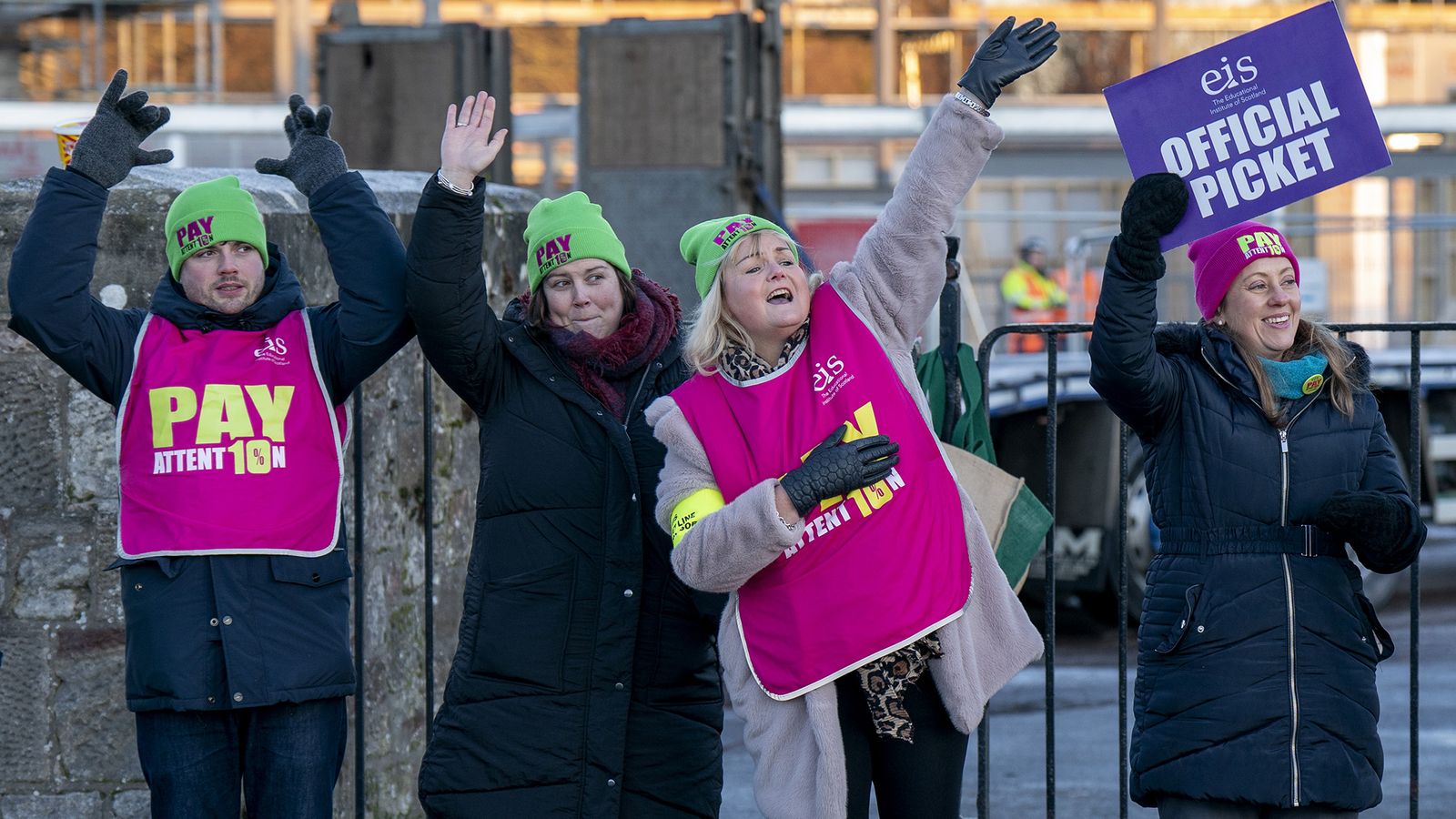A union chief has said she is “very surprised” industrial action has “got this far” amid a fresh wave of rolling strikes by teachers across Scotland.
Members of the Educational Institute of Scotland (EIS) union began 16 days of strike action in a dispute over pay on Monday. Teachers in two of Scotland’s 32 local authority areas will protest each day until 6 February.
The first two councils affected are Glasgow, where all schools are closed, and East Lothian, where they are shut to all pupils apart from those sitting preliminary exams.
The EIS has also planned a further 22 days of industrial action, starting at the end of February.
Andrea Bradley, EIS general secretary, said the walkouts were a “last resort” and urged the Scottish government and Convention of Scottish Local Authorities (COSLA) to do more to resolve the dispute.
Speaking to Sky News in Glasgow, Ms Bradley said: “We very much hope that we will be able to settle it.
“We very much hoped that we wouldn’t have had to take one day of strike action, and we had urged the Scottish government and COSLA to do all that they could to resource a settlement before we got to 24 November, which was the first day of strike action. And we have been doing the same ever since that day.”
Toddler hit on head by brick thrown through bus window in Glasgow
‘Arthur Knight’: Man in UK accused of being US fugitive ‘tried to organise fake memorial mass by posing as grieving widow’
‘Arthur Knight’: Man accused of being US fugitive is convicted of abusing hospital staff in Glasgow
EIS members have previously taken three days of strike action, one in November and two in January, while members of other teaching unions also walked out on those days in January and on two dates in December.
Ms Bradley added: “We actually are very surprised that it has got this far… that in a country where education is said to be such a priority, a number one priority of the government, we are now entering the third day of strike action by the largest teachers’ union in the country.”
Union admits impacts of strikes on children
The pay dispute has been ongoing since February last year.
Unions have rejected a pay offer which would see most teachers receive a 5% wage rise, although the lowest earners would get an increase of 6.85%.
The Scottish government has previously insisted the 10% rise teachers are demanding is unaffordable.
Read more:
Striking teachers deliver message to parents
PM could block Scottish gender law change
Explained – how strikes unfolded in the past and what they achieved
Ms Bradley said there has been months of discussion around the negotiating table before it “got to this point”.
She added: “We understand that this is disruptive for students, it’s disruptive for those who are preparing to take exams in the spring term.
“It’s disruptive for our youngest learners also. It’s particularly disruptive in light of the experiences that those children have had over the course of the pandemic.
“This is not where teachers would wish to be. These teachers behind me would rather not be on this picket line, they would rather be in classrooms working with children and young people.
“But as I said, this strike action today is part of a last resort. A last resort to get the Scottish government and COSLA to pay serious attention to the needs of teachers.”
‘Disappointing’ strikes in ‘no one’s interest’
Councillor Katie Hagmann, COSLA spokesperson for resources, said: “COSLA leaders are clear that given the financial pressures being faced it remains the case that the 10% ask of the trade unions remains unaffordable and therefore we still remain a distance apart in terms of a settlement.”
Scotland’s Education Secretary Shirley-Anne Somerville added: “It is disappointing that the EIS has proceeded to escalate industrial action – we are continuing to urge teaching unions to reconsider their plans while talks are ongoing.
“Recent discussions have been constructive. There has been a shared understanding that talks have been focused on discussing potential areas for compromise – not on tabling a new offer at this stage.
“To date, we have made four offers, all of which have been rejected, but we remain absolutely committed to reaching an agreement on a pay deal that is fair and sustainable for all concerned.”






